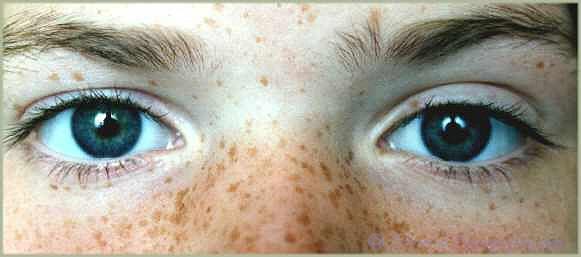How accurately you focus an image can make or break the image, sometimes the moment is over as soon as it has begun thus preventing a second, more precise, shot. Todays auto focus cameras are quite quick and accurate but the photographer must know how to use the cameras focusing system correctly.
Most auto focus cameras use the central point of the viewfinder as the point of focus. Everything else in the image is ignored. Modern advanced cameras often have multi-zone focusing. Even with these extra focusing areas, unless you change the focusing area the central area of the viewfinder would still be the default area set the cameras. Single point systems are always read from the centre of the viewfinder
 Sharp Eyes = Captivating Image |
There are various methods to focusing depending on the type of subject being photographed. With portrait and animal photography, whether it is man or beast, the most important part of the image to capture sharply is the eyes.
If the subjects eyes arent sharp, it is a serious detriment to the image. With most portrait images the viewer will be directed straight to the eyes of the subject, this is a natural occurrence. Therefore the sharper and clearer the subjects eyes, the better the impact of the image.
With single zone cameras for portrait photos you aim the centre of the viewfinder at the subjects eyes when you activate the focusing system. Usually this is performed by half depressing the shutter button. If there is a need to compose the image with the eyes in another part of the frame, the focusing can be locked by holding the shutter button in the halfway position and recomposing before fully depressing the shutter button.
For multi-zone focusing cameras you can select the focus point area nearest the area to be focused upon. For portrait photos for example, you would normally turn the camera vertically, placing the subjects eyes about a third of the way down the frame. Select the focus zone closest to the eyes, and focus, use the focus lock described earlier then recompose and fire.
Multi-zone focusing is very useful if your subject is not dead center. Simply because you can get the composition correct first, and then select the focusing zone you require for your off-centre subject without having to move the camera again.
To learn more about capturing portraits and lighting, please see our Portrait Photography Course
